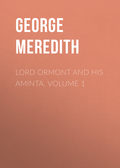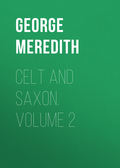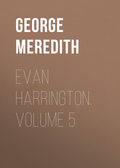
George Meredith
One of Our Conquerors. Complete
CHAPTER XVIII. SUITORS FOR THE HAND OF NESTA VICTORIA
When, upon the well-known quest, the delightful singer Orpheus took that downward way, coming in sight of old Cerberus centiceps, he astutely feigned inattention to the hostile appearances of the multiple beast, and with a wave of his plectrum over the responsive lyre, he at the stroke raised voice. This much you know. It may be communicated to you, that there was then beheld the most singular spectacle ever exhibited on the dizzy line of division between the living and the dead. For those unaccustomed musical tones in the last thin whiff of our sustaining air were so smartingly persuasive as to pierce to the vitals of the faithful Old Dog before his offended sentiments had leisure to rouse their heads against a beggar of a mortal. The terrible sugariness which poured into him worked like venom to cause an encounter and a wrestling: his battery of jaws expressed it. They gaped. At the same time, his eyeballs gave up. All the Dog, that would have barked the breathing intruder an hundredfold back to earth, was one compulsory centurion yawn. Tears, issue of the frightful internal wedding of the dulcet and the sour (a ravishing rather of the latter by the former), rolled off his muzzles.
Now, if you are not for insisting that a magnificent simile shall be composed of exactly the like notes in another octave, you will catch the fine flavour of analogy and be wafted in a beat of wings across the scene of the application of the Rev. Septimus Barmby to Mr. Victor Radnor, that he might enter the house in the guise of suitor for the hand of Nesta Victoria. It is the excelling merit of similes and metaphors to spring us to vault over gaps and thickets and dreary places. But, as with the visits of Immortals, we must be ready to receive them. Beware, moreover, of examining them too scrupulously: they have a trick of wearing to vapour if closely scanned. Let it be gratefully for their aid.
So far the comparison is absolute, that Mr. Barmby passed: he was at liberty to pursue his quest.
Victor could not explain how he had been brought to grant it. He was at pains to conceal the bewilderment Mr. Barmby had cast on him, and make Nataly see the smallness of the grant:—both of them were unwilling to lose Barmby; there was not the slightest fear about Fredi, he said; and why should not poor Barmby have his chance with the others in the race!—and his Nataly knew that he hated to speak unkindly: he could cry the negative like a crack of thunder in the City. But such matters as these! and a man pleading merely for the right to see the girl!—and pleading in a tone… ‘I assure you, my love, he touched chords.’
‘Did he allude to advantages in the alliance with him?’ Nataly asked smoothly.
‘His passion—nothing else. Candid enough. And he had a tone—he has a tone, you know. It ‘s not what he said. Some allusion to belief in a favourable opinion of him… encouragement… on the part of the mama. She would have him travelling with us! I foresaw it.’
‘You were astonished when it came.’
‘We always are.’
Victor taunted her softly with having encouraged Mr. Barmby.
She had thought in her heart—not seriously; on a sigh of despondency—that Mr. Barmby espousing the girl would smooth a troubled prospect: and a present resentment at her weakness rendered her shrewd to detect Victor’s cunning to cover his own: a thing imaginable of him previously in sentimental matters, yet never accurately and so legibly printed on her mind. It did not draw her to read him with a novel familiarity; it drew her to be more sensible of foregone intimations of the man he was—irresistible in attack, not impregnably defensive. Nor did he seem in this instance humanely considerate: if mademoiselle’s estimate of the mind of the girl was not wrong, then Mr. Barmby’s position would be both a ridiculous and a cruel one. She had some silly final idea that the poor man might now serve permanently to check the more dreaded applicant: a proof that her ordinary reflectiveness was blunted.
Nataly acknowledged, after rallying Victor for coming to have his weakness condoned, a justice in his counter-accusation, of a loss of her natural cheerfulness, and promised amendment, with a steely smile, that his lips mimicked fondly; and her smile softened. To strengthen the dear soul’s hopes, he spoke, as one who had received the latest information, of Dr. Themison and surgeons; little conscious of the tragic depths he struck or of the burden he gave her heart to bear. Her look alarmed him. She seemed to be hugging herself up to the tingling scalp, and was in a moment marble to sight and touch. She looked like the old engravings of martyrs taking the bite of the jaws of flame at the stake.
He held her embraced, feeling her body as if it were in the awful grip of fingers from the outside of life.
The seizure was over before it could be called ominous. When it was once over, and she had smiled again and rebuked him for excessive anxiety, his apprehensions no longer troubled him, but subsided sensationally in wrath at the crippled woman who would not obey the dictate of her ailments instantly to perish and spare this dear one annoyance.
Subsequently, later than usual, he performed his usual mental penance for it. In consequence, the wrath, and the wish, and the penitence, haunted him, each swelling to possession of him in turn; until they united to head a plunge into retrospects; which led to his reviewing the army of charges against Mrs. Burman.
And of this he grew ashamed, attributing it to the morbid indulgence in reflection: a disease never afflicting him anterior to the stupid fall on London Bridge. He rubbed instinctively for the punctilio-bump, and could cheat his fancy to think a remainder of it there, just below, half an inch to the right of, the spot where a phrenologist, invited by Nataly in old days, had marked philo-progenitiveness on his capacious and enviable cerebrum. He knew well it was a fancy. But it was a fact also, that since the day of the fall (never, save in merest glimpses, before that day), he had taken to look behind him, as though an eye had been knocked in the back of his head.
Then, was that day of the announcement of Lakelands to Nataly, to be accounted a gloomy day? He would not have it so.
She was happily occupied with her purchases of furniture, Fredi with her singing lessons, and he with his business; a grasp of many ribands, reining-in or letting loose; always enjoyable in the act. Recently only had he known when at home, a relaxation, a positive pleasure in looking forward to the hours of the City office. This was odd, but so it was; and looking homeward from the City, he had a sense of disappointment when it was not Concert evening. The Cormyns, the Yatts, and Priscilla Graves, and Pempton, foolish fellow, and that bothering Barmby, and Peridon and Catkin, were the lineing of his nest. Well, and so they had been before Lakelands rose. What had induced!… he suddenly felt foreign to himself. The shrouded figure of his lost Idea on London Bridge went by.
A peep into the folds of the shroud was granted him:—Is it a truth, that if we are great owners of money, we are so swollen with a force not native to us, as to be precipitated into acts the downright contrary of our tastes?
He inquired it of his tastes, which have the bad habit of unmeasured phrasing when they are displeased, and so they yield no rational answer. Still he gave heed to violent extraneous harpings against money. Epigrams of Colney’s; abuse of it and the owners of it by Socialist orators reported in some newspaper corner; had him by the ears.
They ceased in the presence of Lady Grace Halley, who entered his office to tell him she was leaving town for Whinfold, her husband’s family-seat, where the dear man lay in evil case. She signified her resignation to the decrees from above, saying generously:
‘You look troubled, my friend. Any bad City news?’
‘I look troubled?’ Victor said laughing, and bethought him of what the trouble might be. ‘City news would not cause the look. Ah, yes;—I was talking in the street to a friend of mine on horseback the other day, and he kept noticing his horse’s queer starts. We spied half a dozen children in the gutter, at the tail of the horse, one of them plucking at a hair. “Please, sir, may I have a hair out of your horse’s tail?” said the mite. We patted the poor horse that grew a tail for urchins to pluck at. Men come to the fathers about their girls. It’s my belief that mothers more easily say no. If they learn the word as maids, you’ll say! However, there’s no fear about my girl. Fredi’s hard to snare. And what brings you Cityward?’
‘I want to know whether I shall do right in selling out of the Tiddler mine.’
‘You have multiplied your investment by ten.’
‘If it had been thousands!’
‘Clearly, you sell; always jump out of a mounted mine, unless you’re at the bottom of it.’
‘There are City-articles against the mine this morning—or I should have been on my way to Whinfold at this moment. The shares are lower.’
‘The merry boys are at work to bring your balloon to the ground, that you may quit it for them to ascend. Tiddler has enemies, like the best of mines: or they may be named lovers, if you like. And mines that have gone up, go down for a while before they rise again; it’s an affair of undulations; rocket mines are not so healthy. The stories are false, for the time. I had the latest from Dartrey Fenellan yesterday. He’s here next month; some time in August.’
‘He is married, is he not?’
‘Was.’
Victor’s brevity sounded oddly to Lady Grace.
‘Is he not a soldier?’ she said.
‘Soldiers and parsons!’ Victor interjected.
Now she saw. She understood the portent of Mr. Barmby’s hovering offer of the choice of songs, and the recent tremulousness of the welling Bethesda.
But she had come about her own business; and after remarking, that when there is a prize there must be competition, or England will have to lower her flag, she declared her resolve to stick to Tiddler, exclaiming: ‘It’s only in mines that twenty times the stake is not a dream of the past!’
‘The Riviera green field on the rock is always open to you,’ said Victor.
She put out her hand to be taken. ‘Not if you back me here. It really is not gambling when yours is the counsel I follow. And if I’m to be a widow, I shall have to lean on a friend, gifted like you. I love adventure, danger;—well, if we two are in it; just to see my captain in a storm. And if the worst happens, we go down together. It ‘s the detestation of our deadly humdrum of modern life; some inherited love of fighting.’
‘Say, brandy.’
‘Does not Mr. Durance accuse you of an addiction to the brandy novel?’
‘Colney may call it what he pleases. If I read fiction, let it be fiction; airier than hard fact. If I see a ballet, my troop of short skirts must not go stepping like pavement policemen. I can’t read dull analytical stuff or “stylists” when I want action—if I’m to give my mind to a story. I can supply the reflections. I’m English—if Colney ‘s right in saying we always come round to the story with the streak of supernaturalism.
I don’t ask for bloodshed: that’s what his “brandy” means.’
‘But Mr. Durance is right, we require a shedding; I confess I expect it where there’s love; it’s part of the balance, and justifies one’s excitement. How otherwise do you get any real crisis? I must read and live something unlike this flat life around us.’
‘There’s the Adam life and the Macadam life, Fenellan says. Pass it in books, but in life we can have quite enough excitement coming out of our thoughts. No brandy there! And no fine name for personal predilections or things done in domino!’ Victor said, with his very pleasant face, pressing her hand, to keep the act of long holding it in countenance and bring it to a well-punctuated conclusion: thinking involuntarily of the other fair woman, whose hand was his, and who betrayed a beaten visage despite—or with that poor kind of—trust in her captain. But the thought was not guilty of drawing comparisons. ‘This is one that I could trust, as captain or mate,’ he pressed the hand again before dropping it.
‘You judge entirely by the surface, if you take me for a shifty person at the trial,’ said Lady Grace.
Skepsey entered the room with one of his packets, and she was reminded of trains and husbands.
She left Victor uncomfortably rufed: and how? for she had none of the physical charms appealing peculiarly to the man who was taken with grandeur of shape. She belonged rather to the description physically distasteful to him.
It is a critical comment on a civilization carelessly distilled from the jealous East, when visits of fair women to City offices can have this effect. If the sexes are separated for an hour, the place where one is excluded or not common to see, becomes inflammable to that appearing spark. He does outrage to a bona Dea: she to the monasticism of the Court of Law: and he and she awaken unhallowed emotions. Supposing, however, that western men were to de-orientalize their gleeful notions of her, and dis-Turk themselves by inviting the woman’s voluble tongue to sisterly occupation there in the midst of the pleading Court, as in the domestic circle: very soon would her eyes be harmless: unless directed upon us with intent.
That is the burning core of the great Question, our Armageddon in Morality: Is she moral? Does she mean to be harmless? Is she not untamable Old Nature? And when once on an equal footing with her lordly half, would not the spangled beauty, in a turn, like the realistic transformation-trick of a pantomime, show herself to be that wanton old thing—the empress of disorderliness? You have to recollect, as the Conservative acutely suggests, that her timidities, at present urging her to support Establishments, pertain to her state of dependence. The party views of Conservatism are, must be, founded, we should remember, on an intimate acquaintance with her in the situations where she is almost unrestrictedly free and her laughter rings to confirm the sentences of classical authors and Eastern sages. Conservatives know what they are about when they refuse to fling the last lattice of an ancient harem open to air and sun-the brutal dispersers of mystery, which would despoil an ankle of its flying wink.
Victor’s opinions were those of the entrenched majority; objecting to the occult power of women, as we have the women now, while legislating to maintain them so; and forbidding a step to a desperately wicked female world lest the step should be to wickeder. His opinions were in the background, rarely stirred; but the lady had brought them forward; and he fretted at his restlessness, vexed that it should be due to the intrusion of the sex instead of to the charms of the individual. No sting of the sort had bothered him, he called to mind, on board the Channel boat-nothing to speak of. ‘Why does she come here! Why didn’t she go to her husband! She gets into the City scramble blindfold, and catches at the nearest hand to help her out! Nice woman enough.’ Yes, but he was annoyed with her for springing sensations that ran altogether heartless to the object, at the same time that they were disloyal to the dear woman their natural divinity. And between him and that dear woman, since the communication made by Skepsey in the town of Dreux, nightly the dividing spirit of Mrs. Burman lay cold as a corpse. They both felt her there. They kissed coldly, pressed a hand, said good night.
Next afternoon the announcement by Skepsey of the Hon. Dudley Sowerby, surprised Victor’s eyebrows at least, and caused him genially to review the visit of Lady Grace.
Whether or not Colney Durance drew his description of a sunken nobility from the ‘sick falcon’ distinguishing the handsome features of Mr. Sowerby, that beaked invalid was particularly noticeable to Victor during the statement of his case, although the young gentleman was far from being one, in Colney’s words, to enliven the condition of domestic fowl with an hereditary turn for ‘preying’; eminently the reverse; he was of good moral repute, a worker, a commendable citizen. But there was the obligation upon him to speak—it is expected in such cases, if only as a formality—of his ‘love’: hard to do even in view and near to the damsel’s reddening cheeks: it perplexed him. He dropped a veil on the bashful topic; his tone was the same as when he reverted to the material points; his present income, his position in the great Bank of Shotts and Co., his prospects, the health of the heir to the Cantor earldom. He considered that he spoke to a member of the City merchants, whose preference for the plain positive, upon the question of an alliance between families by marriage, lends them for once a resemblance to lords. When a person is not read by character, the position or profession is called on to supply raised print for the finger-ends to spell.
Hard on poor Fredi! was Victor’s thought behind the smile he bent on this bald Cupid. She deserved a more poetical lover! His paternal sympathies for the girl besought in love, revived his past feelings as a wooer; nothing but a dread of the influence of Mr. Barmby’s toned eloquence upon the girl, after her listening to Dudley Sowerby’s addresses, checked his contempt for the latter. He could not despise the suitor he sided with against another and seemingly now a more dangerous. Unable quite to repress the sentiment, he proceeded immediately to put it to his uses. For we have no need to be scrupulously formal and precise in the exposition of circumstances to a fellow who may thank the stars if such a girl condescends to give him a hearing. He had this idea through the conception of his girl’s generosity. And furthermore, the cognizant eye of a Lucretian Alma Mater having seat so strongly in Victor, demanded as a right an effusion of the promising amorous graces on the part of the acceptable applicant to the post of husband of that peerless. These being absent, evidently non-existent, it seemed sufficient for the present, after the fashion of the young gentleman, to capitulate the few material matters briefly.
They were dotted along with a fine disregard of the stateliness of the sum to be settled on Nesta Victoria, and with a distant but burning wish all the while, that the suitor had been one to touch his heart and open it, inspiriting it—as could have been done—to disclose for good and all the things utterable. Victor loved clear honesty, as he loved light: and though he hated to be accused of not showing a clean face in the light, he would have been moved and lifted to confess to a spot by the touch at his heart. Dudley Sowerby’s deficiencies, however, were outweighed by the palpable advantages of his birth, his prospects, and his good repute for conduct; add thereto his gentlemanly manners. Victor sighed again over his poor Fredi; and in telling Mr. Sowerby that the choice must be left to her, he had the regrets of a man aware of his persuasive arts and how they would be used, to think that he was actually making the choice.
Observe how fatefully he who has a scheme is the engine of it; he is no longer the man of his tastes or of his principles; he is on a line of rails for a terminus; and he may cast languishing eyes across waysides to right and left, he has doomed himself to proceed, with a self-devouring hunger for the half desired; probably manhood gone at the embrace of it. This may be or not, but Nature has decreed to him the forfeit of pleasure. She bids us count the passage of a sober day for the service of the morrow; that is her system; and she would have us adopt it, to keep in us the keen edge for cutting, which is the guarantee of enjoyment: doing otherwise, we lose ourselves in one or other of the furious matrix instincts; we are blunt to all else.
Young Dudley fully agreed that the choice must be with Miss Radnor; he alluded to her virtues, her accomplishments. He was waxing to fervidness. He said he must expect competitors; adding, on a start, that he was to say, from his mother, she, in the case of an intention to present Miss Radnor at Court....
Victor waved hand for a finish, looking as though, his head had come out of hot water. He sacrificed Royalty to his necessities, under a kind of sneer at its functions: ‘Court! my girl? But the arduous duties are over for the season. We are a democratic people retaining the seductions of monarchy, as a friend says; and of course a girl may like to count among the flowers of the kingdom for a day, in the list of Court presentations; no harm. Only there’s plenty of time… very young girls have their heads turned—though I don’t say, don’t imagine, my girl would. By and by perhaps.’
Dudley was ushered into Mr. Inchling’s room and introduced to the figure-head of the Firm of Inchling, Pennergate, and Radnor: a respectable City merchant indeed, whom Dudley could read-off in a glimpse of the downright contrast to his partner. He had heard casual remarks on the respectable City of London merchant from Colney Durance. A short analytical gaze at him, helped to an estimate of the powers of the man who kept him up. Mr. Inchling was a florid City-feaster, descendant of a line of City merchants, having features for a wife to identify; as drovers, they tell us, can single one from another of their round-bellied beasts. Formerly the leader of the Firm, he was now, after dreary fits of restiveness, kickings, false prophecies of ruin, Victor’s obedient cart-horse. He sighed in set terms for the old days of the Firm, when, like trouts in the current, the Firm had only to gape for shoals of good things to fatten it: a tale of English prosperity in quiescence; narrated interjectorily among the by-ways of the City, and wanting only metre to make it our national Poem.
Mr. Inchling did not deny that grand mangers of golden oats were still somehow constantly allotted to him. His wife believed in Victor, and deemed the loss of the balancing Pennergate a gain. Since that lamentable loss, Mr. Inchling, under the irony of circumstances the Tory of Commerce, had trotted and gallopped whither driven, racing like mad against his will and the rival nations now in the field to force the pace; a name for enterprise; the close commercial connection of a man who speculated—who, to put it plainly, lived on his wits; hurried onward and onward; always doubting, munching, grumbling at satisfaction, in perplexity of the gratitude which is apprehensive of black Nemesis at a turn of the road,—to confound so wild a whip as Victor Radnor. He had never forgiven the youth’s venture in India of an enormous purchase of Cotton many years back, and which he had repudiated, though not his share of the hundreds of thousands realized before the refusal to ratify the bargain had come to Victor. Mr. Inchling dated his first indigestion from that disquieting period. He assented to the praise of Victor’s genius, admitting benefits; his heart refused to pardon, and consequently his head wholly to trust, the man who robbed him of his quondam comfortable feeling of security. And if you will imagine the sprite of the aggregate English Taxpayer personifying Steam as the malignant who has despoiled him of the blessed Safety-Assurance he once had from his God Neptune against invaders, you will comprehend the state of Mr. Inchling’s mind in regard to his terrific and bountiful, but very disturbing partner.
He thanked heaven to his wife often, that he had nothing to do with North American or South American mines and pastures or with South Africa and, gold and diamonds: and a wife must sometimes listen, mastering her inward comparisons. Dr. Schlesien had met and meditated on this example of the island energy. Mr. Inchling was not permitted by his wife to be much the guest of the Radnor household, because of the frequent meeting there with Colney Durance; Colney’s humour for satire being instantly in bristle at sight of his representative of English City merchants: ‘over whom,’ as he wrote of the venerable body, ‘the disciplined and instructed Germans not deviously march; whom acute and adventurous Americans, with half a cock of the eye in passing, compassionately outstrip.’ He and Dr. Schlesien agreed upon Mr. Inchling. Meantime the latter gentleman did his part at the tables of the wealthier City Companies, and retained his appearance of health; he was beginning to think, upon a calculation of the increased treasures of those Companies and the country, that we, the Taxpayer, ought not to leave it altogether to Providence to defend them; notwithstanding the watchful care of us hitherto shown by our briny Providence, to save us from anxiety and expense. But there are, he said, ‘difficulties’; and the very word could stop him, as commonly when our difficulty lies in the exercise of thinking.
Victor’s African room, containing large wall-maps of auriferous regions, was inspected; and another, where clerks were busy over miscellaneous Continents. Dudley Sowerby hoped he might win the maiden.
He and Victor walked in company Westward. The shop of Boyle and Luckwort, chemists, was not passed on this occasion. Dudley grieved that he had to be absent from the next Concert for practise, owing to his engagement to his mother to go down to the family seat near Tunbridge Wells. Victor mentioned his relatives, the Duvidney maiden ladies, residing near the Wells. They measured the distance between Cronidge and Moorsedge, the two houses, as for half an hour on horseback.
Nesta told her father at home that the pair of them had been observed confidentially arm in arm, and conversing so profoundly.
‘Who, do you think, was the topic?’ Victor asked.
She would not chase the little blue butterfly of a guess.







